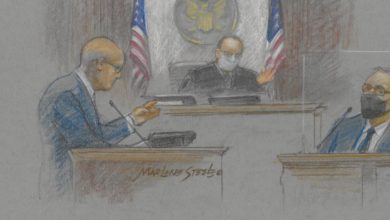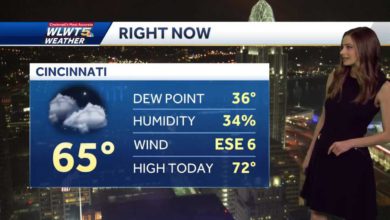
WASHINGTON – President Joe Biden on Tuesday outlined the U.S. response to Russian President Vladimir Putin's invasion of Ukraine as the world braced for a deadly military conflict that could destabilize Europe, rattle the global economy and upend international security.
Biden announced a first round of financial sanctions and vowed that Russia will pay an even steeper price if it continues its aggression.
"This is the beginning of a Russian invasion of Ukraine," he said. "We're ready to respond with unity, clarity and conviction."
Biden said the first wave of U.S. penalties includes "full blocking sanctions" on two major Russian financial institutions, as well as on the country's sovereign debt.
"That means we've cut off Russia's government from Western financing," he said. "It can no longer raise money from the West and cannot trade in its new debt on our markets or the European markets either."
Biden said the U.S. would also impose sanctions on Russia’s elites and their family members, to go into effect on Wednesday.
"They share in the corrupt gains of the Kremlin policies and should share in the pain as well," the president said.
Biden said he had also authorized the additional movement of U.S. forces and equipment already stationed in Europe to bolster America's Baltic allies, including Estonia, Latvia and Lithuania.
"We want to send an unmistakable message that the United States, together with our allies, will defend every inch of NATO territory," Biden said.
The crisis poses a crucial test for Biden as he seeks to keep European allies united and craft a tough response to Putin's attempt to occupy all or part of its neighbor, essentially renegotiating the end of the Cold War.
"This is not the moment for wobbliness and weakness," said Alina Polyakova, president and chief executive officer of the Center of European Policy Analysis, a Washington think tank. "What the Russians have done has rewritten the rules of the European security order and it will have global consequences.”
Former Defense Secretary William Cohen said it was one of the most perilous moments since the end of World War II.
"I think we're at one of the most dangerous periods in our history, certainly since 1945," Cohen told CNN. "The danger that we face here is that, once we take a step, and then Putin responds to it, the cycle tends to escalate."
Putin on Monday ordered troops into two pro-Russian separatist regions in eastern Ukraine that he declared "independent" from Ukraine and in need of military protection.
Russia’s interest in the separatist regions has always been about controlling all of Ukraine’s politics, said Ben Rhodes, who was deputy national security adviser to President Barack Obama.
“Which is one more reason why this should just be seen as a preliminary step,” Rhodes tweeted after Putin's announcement.
That move followed weeks of failed diplomatic efforts to defuse the months-long standoff between Moscow and NATO countries over Ukraine's sovereignty.
But Putin's recent actions, including a rambling, hourlong speech on Monday in which he incorrectly claimed that Ukraine was only the product of power-brokering during the beginning of the Soviet Union, closed off any remaining diplomatic options, said William Pomeranz, the acting director of the Wilson Center's Kennan Institute.
"Putin was never very subtle about what he disliked about the post Cold War settlement," Pomeranz said. "But now, he has essentially torn it up and has not provided any sort of retreat other than full concessions from the West."
Lawmakers on both sides of the aisle called for a quick and decisive response.
Before Biden spoke, Senate Minority Leader Mitch McConnell, R-Ky., said he hoped the president would impose the "toughest possible sanctions."
The invasion raises concerns about the future of European security and triggered a set of punishing economic sanctions from Europe as well, in a coordinated response that NATO leaders said would extend beyond the measures imposed on Russia after its invasion of Ukraine's Crimea region in 2014.
British Prime Minister Boris Johnson unveiled new sanctions on Tuesday against five Russian banks and three wealthy individuals in what Johnson called “the first tranche, the first barrage of what we are prepared to do.”
And Germany announced it will put the breaks on the $11 billion, Russian-owned natural gas pipeline that snakes westward from Russia to northeastern Germany for more than 700 miles under the Baltic Sea.
Biden said there is still time to avert "the worst case scenario that will bring untold suffering to millions of people" – but that's up to Putin.
"We still believe that Russia is poised to go much further in launching a massive military attack against Ukraine. I hope I'm wrong about that," Biden said. “I’m hoping diplomacy is still available."
Biden and U.S. officials have made clear they have no plans to send combat troops to Ukraine but have vowed to send Kyiv more military weapons and lethal aid should there be a full invasion.
“That’s a world war when Americans and Russia start shooting at one another,” Biden told NBC Nightly News earlier this month. “We’re in a very different world than we’ve ever been in.”
Putin 'won't stop' with Ukraine:Why Americans should care about Russia's aggression against its neighbor
Nord Stream 2:How pipeline became a bargaining chip in the crisis between Russia and Ukraine
The U.S has deployed more than 4,000 troops to Poland recently to help shore up NATO's eastern flank in response to Russia'smilitary build-up along Ukraine's border.
The deployment was meant to supplement the more than 80,000 U.S. troops already in Europe on rotational and permanent orders, but Biden has suggested he would deploy more troops to the region in the event of an attack.
Pomeranz expects Russia will accelerate Putin's "slow-moving invasion" into a full-scale, multi-front operation.
"I anticipate that a larger military operation will be introduced in Ukraine, going after Kyiv, and the current Ukrainian government," he said.
Polyakova, likewise, said it's unlikely that Russia would only remain in the separatist regions of regions of Donetsk and Luhansk.
While Russia could choose a “slow creep” into broader parts of Ukrainian territories, Polyakova said, the estimated 190,000 Russian troops encircling Ukraine indicate a more aggressive move toward the Ukraine capital of Kyiv is still on the table.
“However we respond now will determine which scenario and which path they walk down,” she said.
Biden repeated his warning from last week that an escalated conflict could lead to higher gas costs for Americans.
The U.S. has been coordinating with major oil producers to keep energy supplies stable, he said.
The latest developments culminate months of tensions between Moscow and NATO countries after more than 100,000 Russian troops amassed on Ukraine's border, carrying out military exercises with live ammunition and sounding the alarm of a potential invasion.
Russia demanded guarantees that NATO never admit Ukraine and other former Soviet nations as members and that the military alliance roll back troop deployments in other former Soviet bloc countries, a region Moscow still views as its sphere of interest. But NATO leaders refused to abandon the alliance's open-door policy to allow any nation to join and instead offered cooperation on issues like international security.
Geopolitical chess:What are Joe Biden's options with Russia in Ukraine? That all depends on Putin's next move.
'Brothers':Russians, Ukrainians wage fragile peace at Winter Olympics amid threat of war
A flurry of diplomatic meetings across Europe, in Moscow and in Washington over the last two months ultimately failed to de-escalate the unfolding crisis.
Army Gen. Mark Milley, chairman of the Joint Chiefs of Staff, said last month an attack by Russian ground troops, artillery, warplanes and ballistic missiles “would result in a significant amount of casualties."
“It would be horrific,” Milley said. “It would be terrible.”









